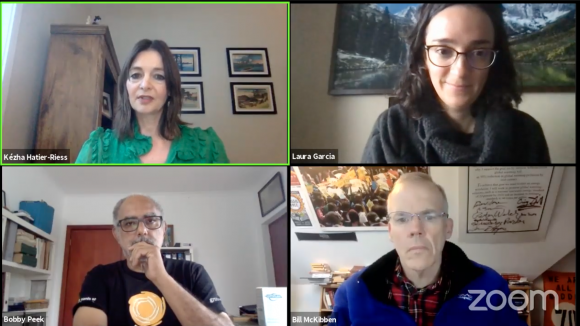
K�zha Hartier-Reiss sits down with Laura Garcia, Bobby Peek and Bill Mckibben to discuss climate change. Jan. 25, 2020. (Mairead Brogan/CU Independent).
The University of Colorado Boulder’s Conference on World Affairs is hosting a three-day virtual event titled International Affairs During the Next Presidential Administration the week of Jan. 25. To start off the event on Monday, climate experts discussed the intersection of feminism, anti-capitalism and open democracy in addressing the climate crisis.
�We need a radical solution because we have procrastinated too long. We have run out of other options,� Laura Garcia, CEO and president of Global Greengrants, said. She points to our romanticization of neoliberalism as the ultimate hurdle for addressing climate change.�
Neoliberalism is an idealogy associated with free-market capitalism and with privatization, globalization and deregulation. The ideals of these systems have greatly affected our ways of thinking and have major environmental consequences.
�We need to romanticize the system of capitalism and free market in order to make it bearable,� Garcia said, �even independent of the climate crisis the truth of the matter is that the capitalist system of today is not working for the majority of the world.��
Fighting climate change means addressing issues of social justice.
�We have been taught to think that these differences, that these disparities, that these inequalities and injustices are natural,� Garcia said, explaining the difficulty we face in addressing climate change which is centered in our societal narrative.
�To be able to make a change, to be able to stop climate change, system change has to happen,� Sven �Bobby� Peek, director of the South African nonprofit Groundwork, added later.�
Peek has served as director of Groundwork since its launch in 1999. Peek and Groundwork advocate for what is known as a �just transition� � a shift toward sustainable production with support for people and workers in mind.�
Garcia paralleled the capitalist exploitation of the environment with the continued oppression of marginalized groups like women, fitting feminism and ecofeminism into the discussion.
�Feminism lets us recuperate that imagination and lets us build a path or a road map towards the replenishment and renewing of the systems and of society,� Laura Garcia said, advocating a shift from the capitalist narrative.�
The panel urged increased participation in open democracy and a radical change in the way we relate to capitalism.
�The job of activists above all is to change the zeitgeist, to change the sense of what people think is normal and natural and obvious,� Founder of 350.org Bill Mckibben said, �then legislation and other things follow much more easily.�
Corporate capitalism is pervasive and hugely detrimental in the climate fight. Mckibben called out corporations including JPMorgan Chase Bank. According to Mackibben, Chase has contributed over $250 billion to the fossil fuel industry.
�Standing up to those guys is really important,� Mckibben said. He and author and activist Naomi Klein have lead massive divestment efforts from fossils fuels.�
But calling for change isn�t always easy, Peek explained.
�Climate change and what drives climate change is also violent and people are dying because they are saying �no� to fossil fuels� Peek said, referencing the murder of South African activist Fikile Ntshangase. At age 65, Ntshangase was shot dead in her home after speaking out against the extension of an opencast mine operated by Tendele Coal.�
Climate change is not just deadly for activists. From deadly hurricanes to raging wildfires often the most vulnerable people are the most hurt.�
�The iron law of climate change is the less you did to cause it the sooner and the harder you get hit,� Mckibben said. The corporations that benefit the most from the exploitation of environmental resources are the most protected when the realities of climate change come to fruition.
Contact CU Independent Senior News Editor Mairead Brogan at mairead.brogan@colorado.edu.
